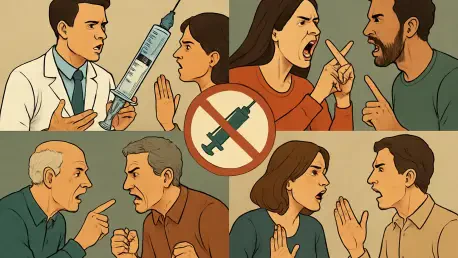Imagine a nation where trust in life-saving vaccines crumbles, leaving communities vulnerable to diseases once thought eradicated, and this is the stark reality unfolding in 2025 as Robert F. Kennedy Jr., in his role as Health and Human Services (HHS) Secretary, spearheads a controversial shift in vaccine policy. His long-standing skepticism toward immunization has sparked heated debates, fragmented national health strategies, and raised alarms among experts and citizens alike. This roundup article gathers diverse perspectives from public health leaders, state officials, and advocacy groups to explore the profound disruptions caused by Kennedy’s stance. The aim is to provide a comprehensive look at the challenges, opinions, and potential paths forward in this polarizing public health crisis.
Unpacking the Controversy: Kennedy’s Role in Public Health Upheaval
Robert F. Kennedy Jr.’s appointment as HHS Secretary has thrust vaccine policy into the spotlight, with his history of questioning vaccine safety igniting widespread concern. Many public health officials argue that his influence marks a turning point, threatening decades of cohesive immunization efforts. Reports indicate that his actions, such as restructuring key federal health bodies, have led to a sharp decline in confidence among state governments and medical professionals who once relied on unified federal guidance.
The significance of this issue cannot be overstated, as it jeopardizes the foundation of disease prevention in the United States. Experts from various health organizations highlight that the erosion of trust in federal agencies like the Centers for Disease Control and Prevention (CDC) could have lasting repercussions. This roundup delves into the cascading effects of Kennedy’s policies, from splintered state responses to heightened public health risks, offering insights into how this controversy reshapes national well-being.
A broad spectrum of voices, ranging from concerned policymakers to grassroots advocates, emphasizes the urgency of addressing this upheaval. The focus here is not only on the immediate fallout but also on the broader implications for how health policy is perceived and implemented. By examining these diverse viewpoints, a clearer picture emerges of the challenges facing the nation’s public health landscape.
The Ripple Effects of Kennedy’s Vaccine Policies
Shattered Trust in Federal Health Leadership
Kennedy’s bold moves, including overhauling the CDC’s vaccine advisory committee with individuals skeptical of immunization, have drawn sharp criticism from public health veterans. Many seasoned professionals express alarm over what they see as a direct attack on scientific integrity, noting that such changes prioritize personal beliefs over established research. This sentiment is echoed across numerous health forums where trust in federal leadership is described as critically damaged.
State health departments, once aligned with CDC recommendations, now voice frustration over what they perceive as politically driven decisions. Several regional health leaders argue that Kennedy’s public statements, which often challenge the credibility of federal health bodies, have fueled public doubt. This growing skepticism complicates efforts to maintain consistent messaging about vaccine safety and necessity.
The debate over scientific evidence versus political influence remains a central concern among medical societies. While some defenders of Kennedy’s approach claim it addresses long-standing corruption within health agencies, the majority of public health commentators warn that sidelining expertise risks undermining decades of progress. This tension continues to shape discussions on how to rebuild faith in national health leadership.
A Splintered National Immunization Framework
Across the country, states are diverging from federal guidance, creating independent policies that reflect local priorities. Coalitions like the West Coast Health Alliance have emerged, uniting states to issue their own vaccine recommendations in response to perceived federal unreliability. State officials involved in these efforts argue that such measures are necessary to protect their populations amid national uncertainty.
This fragmentation manifests starkly in contrasting policies, such as one state eliminating school vaccine mandates while another reinforces strict requirements. Health administrators from states maintaining rigorous standards express concern that neighboring regions with lax rules could become hotspots for preventable diseases. These disparities highlight the challenges of maintaining a unified front against health threats.
Public health analysts caution that a patchwork system risks breaking down herd immunity, which depends on high vaccination rates across all areas. Many stress that inconsistent access to vaccines could create pockets of vulnerability, endangering entire communities. The consensus among these voices is that a return to coordinated national strategies is essential to mitigate these dangers.
Financial Burdens and Access Challenges on the Horizon
The economic fallout of shifting vaccine policies is a growing worry for health economists and policy experts. If federal recommendations for certain vaccines are withdrawn, insurance coverage under programs like Medicaid and private plans could falter, leaving millions to bear out-of-pocket costs. Several state representatives note that while some regions are stepping in with local mandates to ensure coverage, not all have the resources to do so.
Advocacy groups focused on health equity point out that such financial barriers could disproportionately affect low-income families, widening existing disparities. Discussions among these organizations reveal a shared fear that fragmented policies may lead to long-term access issues, particularly in underserved areas. The potential for increased health inequities drives calls for sustainable, nationwide solutions.
Questions linger about the viability of maintaining vaccine access under a decentralized system. Health policy analysts argue that without federal backing, the burden on states to fund and distribute vaccines could strain budgets and infrastructure. This perspective underscores the need for a cohesive approach to prevent a crisis of affordability and availability.
Rising Public Health Threats Amid Policy Chaos
An alarming uptick in vaccine-preventable diseases, such as measles and whooping cough, has been linked to declining immunization rates in recent data. Public health researchers warn that inconsistent state policies exacerbate this trend, creating environments where outbreaks are more likely. Many attribute these risks directly to the confusion and skepticism fueled by current federal rhetoric.
Voices from emerging advocacy coalitions emphasize the urgency of countering misinformation with clear, science-based communication. These groups argue that the lack of unified guidance has allowed vaccine hesitancy to flourish, endangering vulnerable populations like children and the elderly. Their insights reveal a pressing need for grassroots efforts to reinforce trust in immunization.
Critics of Kennedy’s stance challenge the idea that policy reform justifies such public health risks. Numerous health professionals assert that the potential resurgence of eradicated diseases outweighs any perceived benefits of disrupting established systems. This viewpoint calls for a critical reassessment of priorities to safeguard community health against preventable threats.
Navigating the Fallout: Key Insights and Practical Steps
The consequences of Kennedy’s vaccine policies are multifaceted, encompassing eroded trust in federal health bodies, fragmented state approaches, financial strains on families, and heightened risks of disease outbreaks. Public health leaders across the spectrum agree that these disruptions pose a significant challenge to national health security. Their collective insights paint a picture of a system in urgent need of stabilization.
Practical strategies are emerging from various quarters to address these issues. State collaboratives are encouraged to strengthen their independent frameworks, while advocacy groups focused on vaccine education are seen as vital in promoting science-based information. Supporting such initiatives is viewed as a key step in maintaining immunization access at the local level.
Engagement from the public is also deemed critical by many commentators. Staying informed about regional vaccine policies and advocating for equitable access can empower communities to navigate this complex landscape. These actionable recommendations provide a pathway for stakeholders to contribute to rebuilding a resilient public health framework.
Looking Ahead: The Future of Public Health in a Polarized Landscape
Reflecting on the discussions that unfolded, it became clear that Kennedy’s vaccine stance had fractured the cohesion of national health strategies, leaving a lasting impact on trust in scientific leadership. The diverse opinions gathered highlighted a shared concern over the erosion of unified immunization efforts. State responses and advocacy movements had emerged as critical counterweights to federal uncertainty during this period.
Moving forward, restoring confidence in evidence-based policy stands out as a paramount goal. Encouraging collaboration between states, health organizations, and community groups offers a promising avenue to mend the divides. Exploring innovative funding models to ensure vaccine access for all remains a vital consideration for policymakers in the aftermath of these disruptions.
Additionally, amplifying the reach of science-driven advocacy can help counteract misinformation and rebuild public trust. Investing in education campaigns that address vaccine hesitancy at the grassroots level could prove transformative. These steps, rooted in unity and expertise, chart a hopeful course toward protecting public health in an era marked by division.









